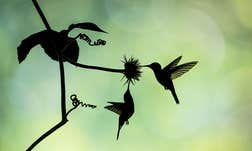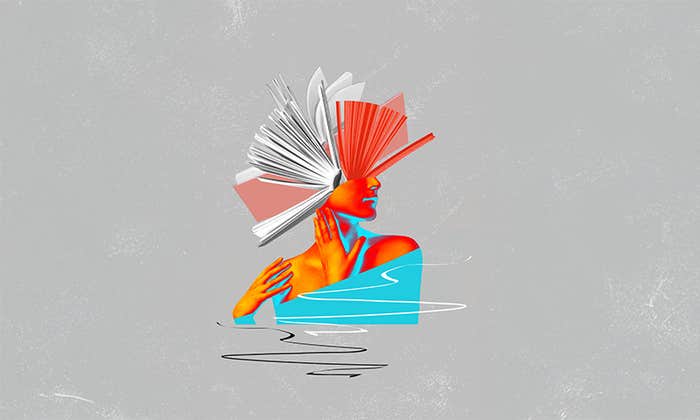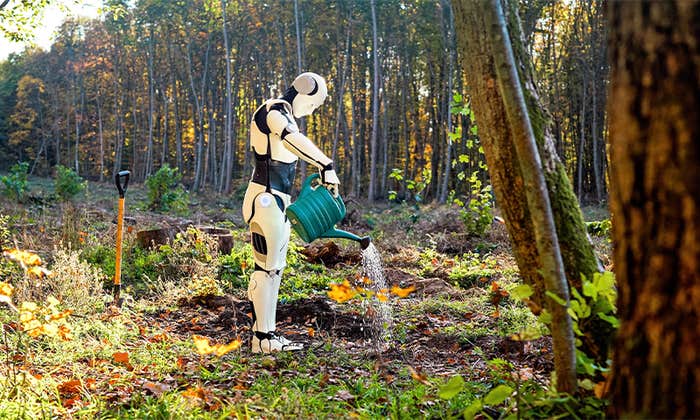When the power goes out, the two young scientists are plunged into pitch blackness. After exclamations and fumbling they turn their phone lights on, creating bisecting cones that spear wildly at the darkness and dance over the ceiling.
“I guess they didn’t take seriously the idea of a power outage in a Manhattan research facility?” Kierk says. “And it’s past midnight. We might be the only ones here.”
“Oh my god, the organoids!” Carmen exclaims, “They’ll die without power. We have to check on them.”
It takes a couple minutes to find the right floor in the darkened research building. The lock to the lab beeps red to both their cards and through the glass window the lab is in shadow. She can’t see the cerebral organoids, the small brains grown from induced stem cells taken from adult human tissue samples. Among them is the organoid from her tissue sample—and it doesn’t look like it or any of the others are getting heat or light. Carmen is already calling, pacing the hall.
“Hey! Hey, it’s Carmen.”
“What? Is this Carmen?” The tinny reply is from Todd, the researcher in charge of the organoid project.
“Todd, the power is out. That’s why I’m calling. We’re at the lab and the door is locked and the power is out.”
“That is so bad … why are you the one calling me?”
“We were in the building when the power went out. We feel a connection to them. You made the organoids from the members of our research program. Those mini-brains are us. Kind of.”
“Just hang on, we’re coming.”
“Why isn’t there a backup generator?” Kierk asks as Carmen hangs up.
“There is one. Supposedly. Either something went wrong or it only serves some areas.”
They sit illuminated by phone screens, looking online for the cause of the outage, which seems to be some freak blowout at a power station north of Manhattan.
Minutes pass. Carmen keeps peering through the glass, looking for any sign of light from inside. Occasionally she finds herself thumbing the small scar on her arm that the original punch biopsy left from her sample being taken months ago. She feels energetic despite the late hour, but some smaller part of her is getting flashes of tiredness, like she is two reservoirs and one is filling up as the other drains away.
“When are you going to give this up?” Kierk suddenly asks, putting down his phone. “This investigation into Atif’s murder. Or non-murder. The accident. Whatever it was. I mean, lucky for the organoids we were here tonight, sure, but it’s only because we were chasing down yet another lead to… absolutely nothing.”
“Atif was part of our program. I can’t explain how I know what happened, but his death wasn’t just a meaningless accident. I just… believe.”
“But the null hypothesis—”
A clattering from the stairwell precedes Todd and Amanda, his assistant, both flushed and breathing heavily. Kierk and Carmen immediately ply them with questions about what’s going on outside, getting only that the two had just biked here through an empty city (Carmen doesn’t remark on what a coincidence it was that they both got here at the same time, unless they left from the same location).
“It’s like in a children’s book where someone cast a spell and the whole kingdom goes to sleep,” Amanda says breathlessly as the four head inside after Todd unlocks the door, past the stocked shelves and shadows of microscopes.
Carmen pans her light over the far table where the eight Erlenmeyer flasks sit silently like tombs containing the organoids, one for each of the original eight Francis Crick Scholars. Seeing them prompts Todd’s cry of—“No, no, no!” With the heat lamps off the air is cool, and on closer examination the Matrigel fluid inside the flasks has begun to separate. The organoids are perfectly still at the bottom, strange planetoids out there alone, glinting and fleshy and white.
“They’re dying,” Carmen says sadly, crouching down to examine hers.
“We have to do it now,” Todd says grimly. “More than a month’s work … Damn!” He slams his hand down on the table and the Matrigel jiggles. Then he disappears into the outside room.
“Can’t you just restart the heat lamp or whatever?” Carmen asks Amanda.
Amanda shakes her head as she snaps gloves on. “No, they’re irrecoverable. How can we be sure this didn’t affect the results? If we do the slices now, at least we can run histology, look at the cytoarchitecture.”
“So you’re going to cut our clones up?” Kierk asks.
“We don’t use that word.”
“But that’s what they are.” Kierk is staring at the blob swaying in the current. “This is the excised neural tube of my clone, stuck in a vat trying to grow into a brain.”
“I mean, technically …”
“What’s this white bubble growing off of mine?” Carmen says, pointing. “It looks like a little cup or saucer or …”
“Oh,” Amanda says, leaning over Carmen. “It’s trying to grow an eye.”
Carmen shivers. “It’s trying to see?”
“It’s not like the eye is going to be functional,” she says. But when Carmen holds the phone light up she swears the white puckering cup darkens slightly, as if attempting to dilate.
“Thank god you called us. We were asleep, we never would have known—” Amanda cuts off, looking shocked at herself. Carmen is already touching her arm. “Oh honey. Don’t worry. We won’t tell anyone.”
“What were you two even doing here this late?” Amanda asks.
“Trying to catch a murderer. Supposedly,” Kierk says quietly, crouching nose-to-nose with his organoid’s flask.
“Atif’s death? Wasn’t it an accident?” Amanda’s eyes flicker over to Atif’s organoid.
“We … I … don’t think so,” says Carmen.
“Spooky,” Todd says in a clipped voice, coming back in. He grabs up Atif’s flask and heads back out. Carmen lets out a low moan of protest. With a sympathetic look Kierk grabs up his organoid’s flask. Carmen looks torn, and Kierk briefly wonders if she’s going to make a break for it with hers, but soon she’s joining him in delivering their mini-brains to the outer room.
Todd has set up the brain slicer, a vibratome, under a lamp so bright after so much darkness that Kierk and Carmen shield their eyes with their free hands. Both the lamp and the vibratome are plugged into a big silver battery. The vibratome is a long metal malocclusion. On the front an open jaw sports a silver metal pad, immersed in some buffer liquid, while tiny blades wait to be lowered down. Todd reaches into the ooze of the Matrigel with his gloved hand, a grimace on his face. Carefully he pulls Atif’s organoid up, cupping its underside. Amanda squirts a drop of superglue to the base of the organoid and affixes it to the metallic plate of the vibratome. The organoid, several inches in diameter, white as undifferentiated flesh, sits on the cutting plate like a wet tumor freshly removed.
“It’s the last of him,” Carmen says suddenly. “He’s gone and that’s the last … part of him.”
“Just an organoid, Carmen,” Todd says. “Set it for fifty microns.” The blades are lowered with an electric-razor hum and the machine takes the thinnest sliver off the top, almost impossible to see until Amanda, using tweezers, scoops it off. The slice hangs in the air like the effluvia of a ghost, then is lowered into a small plastic container filled with clear but viscous liquid. It floats to the bottom and then the vibratome hums and another slice sinks down to join the first. This continues in silence, both Kierk and Carmen gripping their flasks, and in only a few minutes the organoid has been halved—Kierk, leaning over, can see white-matter tracts running in bands through the center. So there had been neural activity.
Meanwhile, Todd has scrounged up another vibratome, which he sets up. Amanda, finishing, scratches off the last of Atif’s organoid from the metal plate and chucks it into a biohazard bag. Carmen shoots Kierk an indignant look, but then Todd and Amanda turn to them expectantly. After a moment’s hesitance they hand over their flasks. In silence they step back and watch the same process unfold. First their organoids are extracted, glued to the plate, then the hum of vibratomes starts. Carmen’s hand searches and clasps Kierk’s. At the first slice Carmen gasps and her hand tightens, both standing just inside the circle of light where the other two are carefully slicing, removing and storing the tissue, thin as paper. There is a meditativeness to it, a silence, Kierk and Carmen hypnotized by the pair leaning over their tasks Talmudically, as if watching two medieval illustrators at their desks.
As this occurs a strange state has stolen over Kierk, perhaps from the nervousness of the night and the lateness of the hour, but he keeps blinking away strange fantasies that come and go, forms beyond language, like he is downloading dreams bit by bit, memories with only the minimal outlines of content, experiences which feel like they are from a different time or a different self. He also knows that he must be imagining this, a mere trick of the mind, an influence from the gravitas of the setting and his current suggestible state. But looking over at Carmen, who has tears running in tracks down her face, he wonders if she feels it too. He squeezes her hand reassuringly.
Todd wipes at his forehead with his wrist, turns to them. “Listen, I appreciate you calling us, you really did save the whole experiment. But we’ve got this. No need for you here.”
“We’ve got stuff to do anyways,” Carmen says quietly, wiping at her eyes discreetly.
“Will you be able to do a paper with the data?” Kierk asks.
“Probably not. This time around we’re just checking the cytoarchitecture, making sure there really were neurons, that kind of thing.”
“What do you mean ‘this time around’?” Carmen says.
“We’ll be redoing the experiment,” Todd says. “The original samples from your skin have all reverted to pluripotency. They’re effectively stem cells, which we can use to make more.”
“How many are there going to be?”
“People like to use cell lines that get established early on in the field, for replicability. You’re part of the prestigious Francis Crick program so there’s a novelty aspect. They grew exceptionally well too, better than anything out there. I imagine your lines will be extremely popular. And the lines are kept around forever. People in a hundred years might still be using these. Congratulations, you’re immortal.” Todd laughs thinly.
There is stunned silence. Carmen’s hand slips from Kierk’s as her voice raises—“What? A cell line? A fucking cell line? Are you kidding me?”
Kierk is struck by the thought of all his clone’s brains growing, again and again, the same struggling pattern repeating until one day their total mass exceeded this very building, the gigantic weight of all those future hims in dishes all over the world. His own personal Boltzmann brains.
“Come on, Carmen. It’s been a crazy night already. Let’s go.” He tugs on her arm.
“But … You had no right!” Carmen raises her voice. “We didn’t know it’d be a cell line!”
“You’re not acting like a scientist. Control yourself,” Todd says, the professorial rebuke clear in his voice.
“You had—” Kierk tugs Carmen away toward the door as she yells “—no fucking right!”
In the bowl of lamplight with the vibratomes set up Todd stands with his arms crossed while Amanda looks bewildered by the outburst.
“I didn’t judge it to be pertinent information,” Todd says, glancing over at the remaining lumps resting lifeless at the bottom of the flasks. “If it makes you feel any better it’s not like they’re conscious.”
Carmen yells back as the door is closing—“How could you possibly know that?”
Kierk keeps a hand on her arm until they are in the dark stairwell. Once the door clangs shut behind them, they sink to their knees, exhausted, silent. In the utter black it’s possible to entertain the idea that the labyrinthine stairwell goes down forever. Carmen’s reason tells her that she is only five or six floors up but some other, deeper sense is screaming that she is entirely wrong, that she’s nowhere at all. She puts her head back against the cool concrete, feeling like she is floating in the blackness, the outside world a meaningless thing far beyond.
So this is what it is like.
Erik Hoel is a research assistant professor at Tufts University. He received his Ph.D. in neuroscience from the University of Wisconsin-Madison, was previously a postdoctoral researcher Columbia University, and has been a visiting researcher at the Institute for Advanced Study. A 2018 Forbes “30 Under 30” for his neuroscientific research on consciousness, he has won awards for his essays and fiction writing, and was a 2017 Center for Fiction NYC Emerging Writers Fellow. The Revelations is his first novel.
From The Revelations: A Novel © 2021 Erik Hoel, published April 6, 2021 by The Overlook Press, an imprint of ABRAMS. Excerpted and abridged with permission of the publisher.
Lead image: SKatzenberger / Shutterstock


























